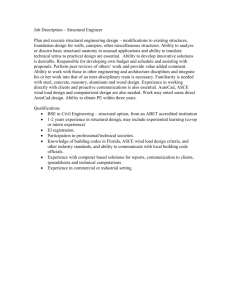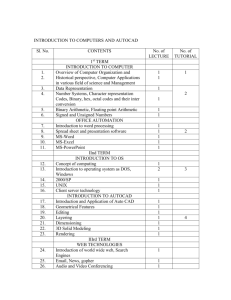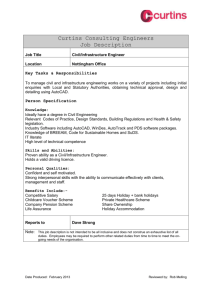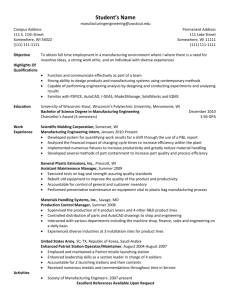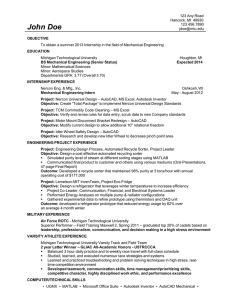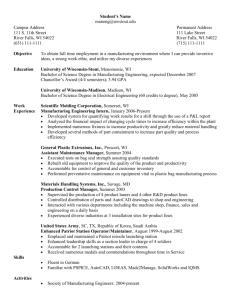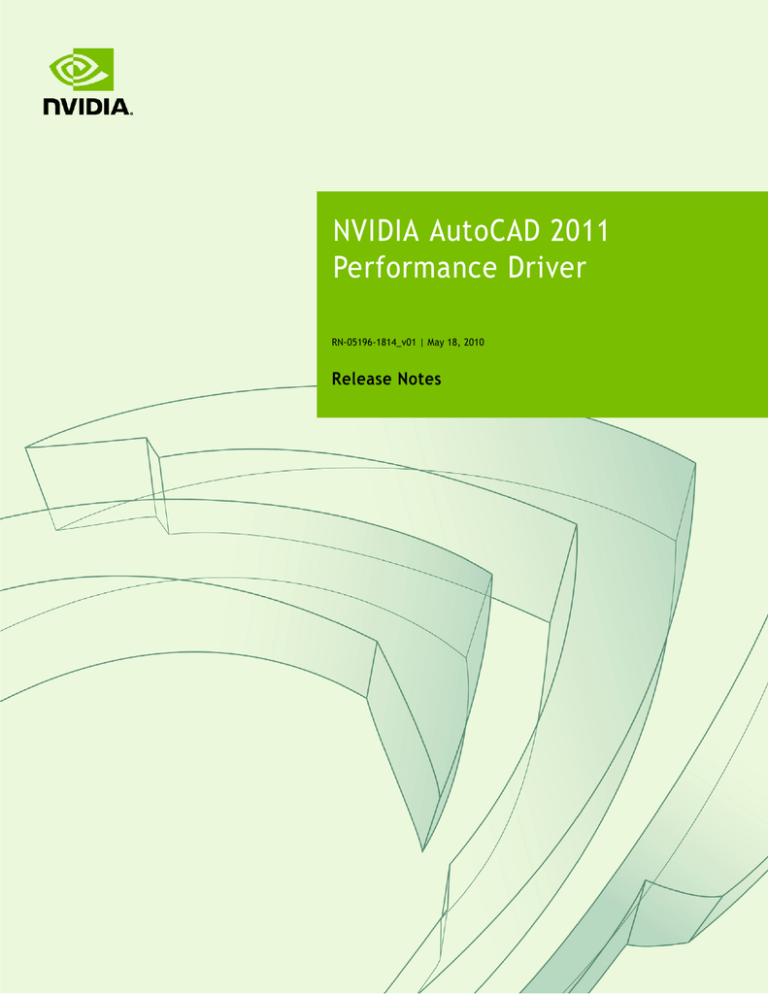
NVIDIA AutoCAD 2011
Performance Driver
RN-05196-1814_v01 | May 18, 2010
Release Notes
TABLE OF CONTENTS
1 Overview and System Requirements............................................ 1
NVIDIA AutoCAD Performance Driver Support and System Requirements ..
General Support..................................................................
Texture and Material Support ..................................................
Driver Release History ..............................................................
2
2
2
3
2 Installing the NVIDIA AutoCAD Performance Driver ......................... 4
Stand-Alone Installation ........................................................... 5
Integrated Installation ............................................................. 6
Stepping through the Installer .................................................... 7
3 AutoCAD Configuration...........................................................10
Configuring Features .............................................................. 10
Key Features ........................................................................ 12
Accelerated Performance ..................................................... 12
3D Hidden Visual Style ...................................................... 12
Conceptual Visual Style..................................................... 13
Quadro FX Comparisons .................................................... 14
Smooth Lines Acceleration .................................................... 15
Turning Adaptive Degradation Off............................................ 17
4 Resolved AutoCAD Performance Driver Issues ..............................18
Issues Resolved for AutoCAD Performance Driver 2011 ...................... 19
Changes and Issues Resolved in Version 18.1.4............................. 19
Changes and Issues Resolved in Version 18.1.2............................. 19
Issues Resolved for AutoCAD Performance Driver 2010 ...................... 20
Changes and Issues Resolved in Version 18.0.0 & 18.0.1 ................. 20
Issues Resolved for AutoCAD Performance Driver 2009 ...................... 21
Changes and Issues Resolved in Version 17.2.2............................. 21
Changes and Issues Resolved in Version 17.2.0 & 17.2.1 ................. 21
Issues Resolved for AutoCAD Performance Driver 2008 ...................... 22
Changes and Issues Resolved in Version 15.09.08.......................... 22
Not NVIDIA Issues................................................................... 23
NVIDIA AutoCAD 2011 Performance Driver
RN-05196-1814_v01 | i
LIST OF TABLES
Table 1.1 NVIDIA AutoCAD 2011 Performance Driver Package Support ................ 2
Table 1.2 NVIDIA AutoCAD Performance Driver Release History ........................ 3
NVIDIA AutoCAD 2011 Performance Driver
RN-05196-1814_v01 | ii
01 OVERVIEW AND SYSTEM
REQUIREMENTS
The NVIDIA® AutoCAD® Performance Driver is an NVIDIA® Quadro® workstation feature. The NVIDIA AutoCAD Performance Driver (software) is seamlessly integrated into the AutoCAD environment and contains significant improvements over existing driver technology. The AutoCAD Performance Driver supports the Autodesk AutoCAD software, including the most recent releases of 2008, 2009, 2010, and 2011. Developed in close collaboration with Autodesk®, the AutoCAD Performance Driver is a free, downloadable software driver capable of delivering dramatic performance improvements of up to 6x on some tests, when coupled with NVIDIA Quadro FX professional graphics solutions. This chapter contains these sections:
“NVIDIA AutoCAD Performance Driver Support and System Requirements” on page 2
“Driver Release History” on page 3
NVIDIA AutoCAD 2011 Performance Driver
RN-05196-001_v01 | 1
Chapter 01 : Overview and System Requirements
NVIDIA AutoCAD Performance Driver Support and
System Requirements
General Support
Table 1.1 lists the AutoCAD, API, and Windows support provided in this driver package. Table 1.1
NVIDIA AutoCAD 2011 Performance Driver Package Support
AutoCAD
Version
API
Performance
Driver
Version
Windows
Operating
System
Driver Package Size
AutoCAD 2011
OpenGL
18.1.4
Win7 32/64 bit
4.1 MB (32-bit Windows OS)
Vista 32/64 bit
6.6 MB (64-bit Windows OS)
XP 32/64 bit
AutoCAD 2010
Direct3D
18.0.1
XP 32/64 bit
Vista 32/64 bit
AutoCAD 2009
OpenGL
18.0.1
XP 32bit
OpenGL
17.2.2
XP 32 bit
Direct3D
17.2.0
XP 32/64 bit
Vista 32/64 bit
AutoCAD 2008
OpenGL
15.09.08
XP 32 bit
Note: The AutoCAD 2011 and 2008 Performance Driver delivers
accelerated performance only on OpenGL.
Note: The AutoCAD 2010 and 2009 Performance Driver delivers
accelerated performance on both OpenGL and Direct3D.
Texture and Material Support
The Advanced Material effects option is not currently supported with the NVIDIA AutoCAD Performance Driver. This is highlighted in the Hardware settings (3Dconfig‐
>Manual Tune). With the ʺnvgl10.hdiʺ driver, ʺAdvanced Material effectsʺ is not an option. It is also highlighted in the View Tune Log (3Dconfig‐>View Tune Log) where Advanced Material effects is listed as not available. Some new materials with AutoCAD 2011 may not look the same from the standard Autodesk driver, or may not support specific effects created in AutoCAD 2011. Textures and materials will support all functionality as in AutoCAD 2010. NVIDIA AutoCAD 2011 Performance Driver
RN-05196-001_v01 | 2
Chapter 01 : Overview and System Requirements
Driver Release History
Table 1.2 provides detailed driver release history and supported operating systems. Table 1.2
NVIDIA AutoCAD Performance Driver Release History
AutoCAD Version
Windows
Operating
System
Performance
Driver
Version
API
Release Date
AutoCAD 2011
Win7 32/64 bit
18.1.4
OpenGL
2010-05-20
18.1.2
OpenGL
2010-03-30
18.0.1
Direct3D
2010-03-30
Vista 32/64 bit
XP 32/64 bit
AutoCAD 2011
Win7 32/64 bit
Vista 32/64 bit
XP 32/64 bit
AutoCAD 2010
XP 32/64 bit
Vista 32/64 bit
AutoCAD 2010
XP 32bit
18.0.1
OpenGL
2009-05-11
AutoCAD 2010
XP 32/64 bit
18.0.0
Direct3D
2009-05-11
Vista 32/64 bit
AutoCAD 2009
XP 32 bit
17.2.2
OpenGL
2009-02-20
AutoCAD 2009
XP 32 bit
17.2.1
OpenGL
2008-04-28
AutoCAD 2009
XP 32/64 bit
17.2.0
Direct3D
2008-04-28
Vista 32/64 bit
AutoCAD 2008
XP 32 bit
15.09.08
OpenGL
2008-04-23
AutoCAD 2007
XP 32 bit
15.08.06
OpenGL
2007-02-01
AutoCAD 20052006
XP 32 bit
15.07.03
OpenGL
2006-02-13
AutoCAD 2004
XP 32 bit
15.07.01
OpenGL
2006-02-03
AutoCAD 2000 2002
XP 32 bit
15.06.06
OpenGL
2003-01-11
XP 32 bit
15.05.13
OpenGL
2002-08-07
NVIDIA AutoCAD 2011 Performance Driver
RN-05196-001_v01 | 3
02 INSTALLING THE NVIDIA AUTOCAD
PERFORMANCE DRIVER
The NVIDIA AutoCAD Performance Driver is designed to deliver the maximum performance benefit within AutoCAD. NVIDIA provides two ways to install the AutoCAD Performance Driver: stand‐alone and integrated with the NVIDIA graphics driver: “Stand‐Alone Installation” on page 5
“Integrated Installation” on page 6
“Stepping through the Installer” on page 7
NVIDIA AutoCAD 2011 Performance Driver
RN-05196-1814_v01 | 4
Chapter 02 : Installing the NVIDIA AutoCAD Performance Driver
Stand-Alone Installation
You can download the standalone AutoCAD Performance Driver from the NVIDIA Web site: http://www.nvidia.com/object/AutoCAD_PD_perf_drivers.html
1 Select the AutoCAD Performance Driver according to the AutoCAD version that is installed and running on your system. Note: You can install more than one version of the NVIDIA AutoCAD
Performance Driver, have multiple versions of AutoCAD running (for
example both 2008 and 2009 versions), and then choose to run the
matching driver to AutoCAD version based on the information provided in Table 1.2, “NVIDIA AutoCAD Performance Driver Release History”
in Chapter 1.
2 Exit AutoCAD before installing the AutoCAD Performance driver.
The package is a self extracting executable. 3 Run setup.exe and go through the prompts. Refer to the section “Stepping through the Installer” on page 7.
NVIDIA AutoCAD 2011 Performance Driver
RN-05196-1814_v01 | 5
Chapter 02 : Installing the NVIDIA AutoCAD Performance Driver
Integrated Installation
Note: The integrated installation with Release 197 graphics drivers
supports AutoCAD 2008, AutoCAD 2009, and AutoCAD 2010.
Integrated installation support for AutoCAD 2011 requires Release
256 and later graphics drivers.
The NVIDIA AutoCAD Performance Driver is included with the release of the NVIDIA graphics driver 197.xx and later that is publicly available from the NVIDIA.com driver download page. When you install the NVIDIA graphics driver, the AutoCAD Performance Driver is placed on your computer and auto‐detection is set to recognize an initialization of AutoCAD.
The NVIDIA AutoCAD Performance Driver is NOT installed during the installation of the NVIDIA graphics driver. When you launch AutoCAD for the first‐time after the installation of the NVIDIA graphics driver, you are prompted to install the AutoCAD Performance Driver ( see Figure 2.1). Note: You must close AutoCAD before installing the Performance
Driver.
Refer to the next section, Stepping through the Installer.
NVIDIA AutoCAD 2011 Performance Driver
RN-05196-1814_v01 | 6
Chapter 02 : Installing the NVIDIA AutoCAD Performance Driver
Stepping through the Installer
The Performance Driver Installer can be started either through the standalone executable or as part of the graphics driver installation. Figure 2.1
First Screen of the AutoCAD Performance Driver Installation
1 To continue and install the AutoCAD Performance Driver, select Next.
NVIDIA AutoCAD 2011 Performance Driver
RN-05196-1814_v01 | 7
Chapter 02 : Installing the NVIDIA AutoCAD Performance Driver
The supported applications screen appears. Figure 2.2
Selecting the AutoCAD Version(s) Installed
2 Select the version(s) of AutoCAD for which you want to install the NVIDIA AutoCAD Performance Driver (Figure 2.2). Only those AutoCAD versions that are detected as installed on your system appear on the page. You can check one or more of the options. 3 Select Next to install the selected AutoCAD versions of the Performance Driver.
NVIDIA AutoCAD 2011 Performance Driver
RN-05196-1814_v01 | 8
Chapter 02 : Installing the NVIDIA AutoCAD Performance Driver
The final status window for the installation shows the drivers that have been installed. Figure 2.3
Last Screen with Status of the Installation
4 Select Exit to close the window (Figure 2.3). 5 Restart AutoCAD to see an immediate performance advantage.
NVIDIA AutoCAD 2011 Performance Driver
RN-05196-1814_v01 | 9
03 AUTOCAD CONFIGURATION
This chapter covers the following main topics:
Configuring Features
Key Features
Configuring Features
Once you have completed the NVIDIA AutoCAD Performance Driver installation, the AutoCAD application selects the AutoCAD Performance Driver as the default.
At this point, you will notice the performance benefits. If you do not experience improved performance, you can manually check and select the correct settings using the steps below.
1 After starting the AutoCAD application, verify that the NVIDIA performance driver is active. 2 To bring up the Manual Performance Tuning dialog box, from the command line, type 3DCONFIG and in the dialog box, select Manual Tune. 3 In the Driver Name list, verify that the performance driver is selected. • In AutoCAD 2008, the driver name is nvgl9.hdi
• In AutoCAD 2009, the driver name will be nvgl9.hdi or nvd3d9.hdi for Windows XP, and only nvd3d9.hdi for Windows Vista.
• In AutoCAD 2010, the driver name will be nvgl10.hdi or nvd3d10.hdi for Windows XP, and only nvd3d10.hdi for Windows Vista.
• In AutoCAD 2011, the driver name will be nvgl10.hdi for Windows XP, Windows Vista, and Windows 7. NVIDIA AutoCAD 2011 Performance Driver
RN-05196-001_v01 | 10
Chapter 03 : AutoCAD Configuration
Figure 3.1
Manual Performance Tuning
NVIDIA AutoCAD 2011 Performance Driver
RN-05196-001_v01 | 11
Chapter 03 : AutoCAD Configuration
Key Features
Accelerated Performance
With the AutoCAD Performance Driver, Quadro graphics boards deliver up to six times the performance, compared to consumer graphics, when using AutoCADʹs 3D Hidden visual style and enables faster manipulation of models in the Conceptual and Realistic visual styles.
3D Hidden Visual Style
The 3D Hidden visual style essentially draws objects in a way that allows depth cues to be retained with minimal lighting effects. Figure 3.2, “3D Hidden Visual Style” shows a model displayed in 3D Hidden style and it is easy to get an instant perception of the shape and layout of the model.
In architectural workflows, frequently, there are large flat surfaces for which the lack of lighting effects yields clarity in the visual representation, which facilitates very quick and intuitive understanding of shape and position. Figure 3.2
3D Hidden Visual Style
NVIDIA AutoCAD 2011 Performance Driver
RN-05196-001_v01 | 12
Chapter 03 : AutoCAD Configuration
Conceptual Visual Style
For components and assemblies comprising curved surfaces, minimal lighting effects is unable to allow the eye to pickup on the subtleties of shape. In these instances being able to perceive gradients and angles allows shape to be recognized significantly quicker. The conceptual visual style (Figure 3.3, “Conceptual Visual Style”) employs a Gooch shader for just these kinds of visual cues. The Gooch shader is a non‐photorealistic shader that changes the hue (i.e. the perceived color versus lightness or contrast) dependent on light and viewing angle. Because it is non‐photo‐realistic, it essentially simplifies the appearance of an object so shape is more instantly recognizable. Figure 3.3
Conceptual Visual Style
Both of these visual styles are accelerated with the use of the AutoCAD Performance Driver. NVIDIA AutoCAD 2011 Performance Driver
RN-05196-001_v01 | 13
Chapter 03 : AutoCAD Configuration
Quadro FX Comparisons
Figure 3.4, “AutoCAD 2011 Performance of Professional Quadro FX Solutions” highlights the comparative differences between similarly priced consumer graphics cards and NVIDIA Quadro graphics cards with the AutoCAD Performance Driver. At comparable prices, AutoCAD performance of professional Quadro FX solutions are far superior to consumer‐class hardware, e.g., 3D Hidden style rendering. Figure 3.4
AutoCAD 2011 Performance of Professional Quadro FX Solutions NVIDIA AutoCAD 2011 Performance Driver
RN-05196-001_v01 | 14
Chapter 03 : AutoCAD Configuration
Smooth Lines Acceleration
Quadro provides significantly higher visual quality in all visual styles with “smooth lines” enabled. You can easily manipulate and orient the fully shaded model without compromising on performance.
Figure 3.5
AutoCAD Rendering with Smooth Lines Turned Off With professional‐class graphics cards such as NVIDIA Quadro FX, you have a fast hardware engine specifically designed to draw AutoCAD‐style smooth lines, which results in aesthetic lines without the performance penalty. Figure 3.6
AutoCAD Smooth Lines Rendered on a Professional Quadro FX
Graphics Card
NVIDIA AutoCAD 2011 Performance Driver
RN-05196-001_v01 | 15
Chapter 03 : AutoCAD Configuration
To enable smooth lines display, follow these steps (Turning Smooth Line Display On):
Note: Enabling Smooth lines display works only on Windows XP and
Windows 7 with the NVIDIA AutoCAD Performance Driver.
1 From the AutoCAD command line, type 3DCONFIG and click Manual Tune.
2 Select nvgl0.hdi for the driver name (for AutoCAD 2011). 3 Select the Smooth lines display option and set to On. Figure 3.7
Turning Smooth Line Display On NVIDIA AutoCAD 2011 Performance Driver
RN-05196-001_v01 | 16
Chapter 03 : AutoCAD Configuration
Turning Adaptive Degradation Off
With the addition of the added performance, you can turn off Adaptive Degradation, which is on by default. This option works to maintain a certain FPS (frames per second) by simplifying models, either dropping the visual style to Wire Frame or simplifying the geometry. To turn this feature off, in the Adaptive Degradation and Performance Tuning dialog box, uncheck Adaptive Degradation if it is currently checked (Turning Adaptive Degradation Off).
1 From the AutoCAD command line, type 3DCONFIG. 2 Click to uncheck Adaptive Degradation. Figure 3.8
Turning Adaptive Degradation Off NVIDIA AutoCAD 2011 Performance Driver
RN-05196-001_v01 | 17
04 RESOLVED AUTOCAD PERFORMANCE
DRIVER ISSUES
This section contains lists of known and resolved issues categorized by the NVDIA AutoCAD Performance Driver version number.
“Issues Resolved for AutoCAD Performance Driver 2011” on page 19
“Issues Resolved for AutoCAD Performance Driver 2010” on page 20
“Issues Resolved for AutoCAD Performance Driver 2009” on page 21
“Issues Resolved for AutoCAD Performance Driver 2008” on page 22
“Not NVIDIA Issues” on page 23
NVIDIA AutoCAD 2011 Performance Driver
RN-05196-1814_v01 | 18
Chapter 04 : Resolved AutoCAD Performance Driver Issues
Issues Resolved for AutoCAD Performance Driver
2011
Changes and Issues Resolved in Version 18.1.4
Fixed several issues with irregular viewports that were not clipping correctly.
Fixed line and polygon styles not displayed incorrectly
Fixed bug with gouraud shaded polylines and polygons.
Fixed issues with analysis shaders.
Fixed shadow map issues.
Reduced idle time CPU usage.
Fixed missing textures with per‐pixel lighting.
Fixed issue with Incomplete display of the UCS icon.
Fixed incorrect object highlighting.
Fixed Gradients that have lines showing through them.
Fixed Residual pixels left behind on the display.
Changes and Issues Resolved in Version 18.1.2
Added 2d mode acceleration to improve performance for 2D drawings.
Improved realistic mode performance, achieving in some cases up to 6X performance advantage over consumer graphics, such as ATI Radeon or Intel Integrated.
Improved phong shader performance, leading to better performance with the ʺConceptualʺ visual Style.
Implemented FBO‐based off‐screen rendering.
Implemented full‐screen antialiasing.
Fixed colored materials for shells and tristrips, improving the visual quality for ʺRealistʺ Visual Style.
Fixed viewport issues in paper space mode.
NVIDIA AutoCAD 2011 Performance Driver
RN-05196-1814_v01 | 19
Chapter 04 : Resolved AutoCAD Performance Driver Issues
Issues Resolved for AutoCAD Performance Driver
2010
Changes and Issues Resolved in Version 18.0.0 & 18.0.1
Fixed crashes that were occuring with Direct3D.
Fixed shadow map issues with the new shadow map shader.
Fixed missing texture issues with the phong shader.
Fixed an issue with the smooth line option not being shown.
Fixed incorrectly evaluated face renditions.
Introduced a new caching structure to handle multiple tri‐strips on one mesh.
NVIDIA AutoCAD 2011 Performance Driver
RN-05196-1814_v01 | 20
Chapter 04 : Resolved AutoCAD Performance Driver Issues
Issues Resolved for AutoCAD Performance Driver
2009
Changes and Issues Resolved in Version 17.2.2
Fixed a corruption issue with the conceptual visual style where edges were rendered with the Gooch shader active, thereby overruling the color to be used for rendering edges.
Fixed occasional crashes or display corruptions that occurred in paper space and multi‐viewport mode. Changes and Issues Resolved in Version 17.2.0 & 17.2.1
Direct3D (nvd3d9.hdi) is now supported for AutoCAD 2009 on Windows Vista or Windows XP. Windows Vista 32/64‐bit and Windows XP 64‐bit are now supported with AutoCAD Performance Driver 2009
Smooth lines are not exposed with the certified drivers from Autodesk. This is a bug with the Autodesk XML database. Note that smooth lines are only supported on Windows XP. To workaround this do the following:
1 Locate AdskHwCertificationDatabase.xml in the following location:
Example: <Documents and Settings\All Users\Application Data\Autodesk\AutoCAD
2009\R17.2\enu\PTSML\AdskHwCertificationDatabase.xml 2 Make sure that you have an updated version from Autodesk. 3 Open the file in a Web browser and view the Source
4 Search for the NVIDIA Quadro‐based graphics card that you are using. For example, it can be NVIDIA Quadro FX 370 or any other supported NVIDIA Quadro‐based graphics card.
5 Under the section for the graphics card you located in step 4, locate the NVIDIA AutoCAD Driver 17.2 release and make the following change. Change:
§<effect name="AALines" status="1" driver="OGL" />
to:
§<effect name="AALines" status="1" driver="ALL" />
NVIDIA AutoCAD 2011 Performance Driver
RN-05196-1814_v01 | 21
Chapter 04 : Resolved AutoCAD Performance Driver Issues
Issues Resolved for AutoCAD Performance Driver
2008
Changes and Issues Resolved in Version 15.09.08
After installation, the AutoCAD Performance Driver “nvgl9.hdi” is now the selected driver under Tools > Options> System (tab) > Performance Settings > Manual Tune by default. Note: When switching to Direct3D or OpenGL and then back to nvgl9.hdi, this default setting is active when returning to the Manual Tune menu. Hues are the same regardless of whether you are using the NVIDIA AutoCAD Performance Driver with OpenGL or Direct 3D.
Smooth lines are not exposed with the certified drivers from Autodesk. This is a bug with the Autodesk XML database. To workaround this problem, do the following:
a Locate AdskHwCertificationDatabase.xml in the following location:
<Autodesk application installation folder>\Drv\AdskHwCertificationDatabase.xml Example:
C:\Program Files\AutoCAD 2008\Drv\AdskHwCertificationDatabase.xml"
b Make sure that you have an updated version from Autodesk.
c Open the file in a Web browser and view the source.
d Search for the NVIDIA Quadro‐based graphics card that you are using. For example, it can be NVIDIA Quadro FX 370 or any other supported NVIDIA Quadro‐based graphics card.
e Under the section for the graphics card you located in step 4., locate the NVIDIA AutoCAD Driver 17.1 release and make the following change:
Change:
§<effect name="AALines" status="1" driver="OGL" />
to
§<effect name="AALines" status="1" driver="ALL" />
NVIDIA AutoCAD 2011 Performance Driver
RN-05196-1814_v01 | 22
Chapter 04 : Resolved AutoCAD Performance Driver Issues
Not NVIDIA Issues
Smooth lines are not exposed with the certified drivers from Autodesk. This is a bug with the Autodesk XML database. Note that smooth lines are only supported on Windows XP. To workaround this do the following:
a Locate AdskHwCertificationDatabase.xml in the following location:
Example: <Documents and Settings\All Users\Application Data\Autodesk\AutoCAD
2009\R17.2\enu\PTSML\AdskHwCertificationDatabase.xml b Make sure that you have an updated version from Autodesk. c Open the file in a Web browser and view the Source
d Search for the NVIDIA Quadro‐based graphics card that you are using. For example, it can be NVIDIA Quadro FX 370 or any other supported NVIDIA Quadro‐based graphics card.
e Under the section for the graphics card you located in step 4, locate the NVIDIA AutoCAD Driver 17.2 release and make the following change. Change:
§<effect name="AALines" status="1" driver="OGL" />
to:
§<effect name="AALines" status="1" driver="ALL" />
NVIDIA AutoCAD 2011 Performance Driver
RN-05196-1814_v01 | 23
Notice
ALL NVIDIA DESIGN SPECIFICATIONS, REFERENCE BOARDS, FILES, DRAWINGS, DIAGNOSTICS, LISTS, AND
OTHER DOCUMENTS (TOGETHER AND SEPARATELY, "MATERIALS") ARE BEING PROVIDED "AS IS." NVIDIA MAKES
NO WARRANTIES, EXPRESSED, IMPLIED, STATUTORY, OR OTHERWISE WITH RESPECT TO THE MATERIALS, AND
EXPRESSLY DISCLAIMS ALL IMPLIED WARRANTIES OF NONINFRINGEMENT, MERCHANTABILITY, AND FITNESS
FOR A PARTICULAR PURPOSE.
Information furnished is believed to be accurate and reliable. However, NVIDIA Corporation assumes no
responsibility for the consequences of use of such information or for any infringement of patents or other
rights of third parties that may result from its use. No license is granted by implication of otherwise under
any patent rights of NVIDIA Corporation. Specifications mentioned in this publication are subject to change
without notice. This publication supersedes and replaces all other information previously supplied. NVIDIA
Corporation products are not authorized as critical components in life support devices or systems without
express written approval of NVIDIA Corporation.
HDMI
HDMI, the HDMI logo, and High-Definition Multimedia Interface are trademarks or registered trademarks of
HDMI Licensing LLC.
Macrovision Compliance Statement
NVIDIA Products that are Macrovision enabled can only be sold or distributed to buyers with a valid and
existing authorization from Macrovision to purchase and incorporate the device into buyer's products.
Macrovision copy protection technology is protected by U.S. patent numbers 5,583,936; 6,516,132;
6,836,549; and 7,050,698 and other intellectual property rights. The use of Macrovision's copy protection
technology in the device must be authorized by Macrovision and is intended for home and other limited
pay-per-view uses only, unless otherwise authorized in writing by Macrovision. Reverse engineering or
disassembly is prohibited.
OpenCL
OpenCL is a trademark of Apple Inc. used under license to the Khronos Group Inc.
Trademarks
NVIDIA and the NVIDIA logo are trademarks or registered trademarks of NVIDIA Corporation in the United
States and other countries. Other company and product names may be trademarks of the respective
companies with which they are associated.
Copyright
© 2008–2010 NVIDIA Corporation. All rights reserved.
www.nvidia.com

